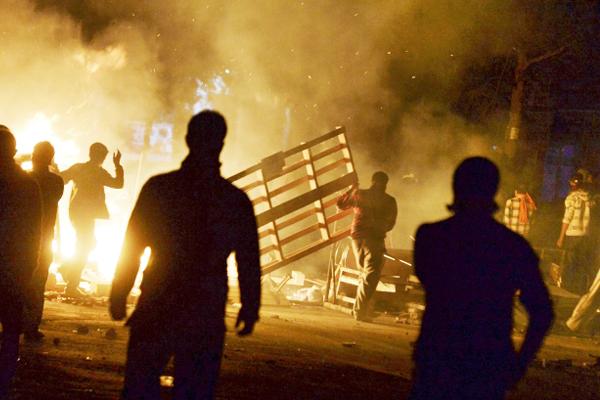Erdogan ignores fresh protests
Sayed Abdel-Maguid
 |
Demonstrators set barricades on fire as they clash with riot police during a protest in Ankara (photo: Reuters)
Turkey’s Erdogan blusters on in blind ignorance that public dissent in the country could be based on real grievances, writes Sayed Abdel-Maguid uruknet.info Turkey is once again haunted by the same turmoil that engulfed it in May. But this time the protests are focussed in the Hatay region on the borders with Syria. Prime Minister Recep Tayyip Erdogan is still in denial about it all. For him, the disturbances are but abnormal occurrences, having nothing to do with how the majority of the population feels. He even threatened those who "attempt to sow disorder", without admitting the veracity of the underlying grievances. In fact, the recent heavy-handedness of the police in Ankara and Istanbul suggests that the government has no intention of changing its current policies. Recently, Erdogan lashed out at what he called the "special interests groups". He was particularly angry at men of finance who, having benefitted from deregulation of the economy, went ahead and offered excessive credit facilities to the public, many of whom later on defaulted on their credit card payments. Having attributed the current crisis to "fabricated unrest", the ruling elite in Turkey now intends to clamp down on the opposition. As the protests continue, Erdogan’s posturing is poised to backfire. When a protester in Hatay was killed by a tear gas canister on 9 September, thousands took to the streets in Istanbul to vent their anger at police brutality. The largest protests took place in Kadikoy, a heavily populated suburb on eastern Istanbul that has just been connected with the western Istanbul via an underwater metro line. The population of Kadikoy had every reason to be grateful for Erdogan over the new metro line, but instead the crowds chanted anti-government slogans. One of them said, "We are not going to stop and the government knows that." When the famous Taksim Square reopened to the public after extensive renovation a while ago, the media voiced satisfaction. But the public took no interest whatsoever. The Turks are simply too distraught over the country’s problems to invest any emotion in symbolic gestures. The very fabric of society is at risk. The national unity that Turkey has always taken for granted looks tenuous now, as the spectre of sectarian fragmentation — for which the prime minister himself is to blame — looms large. While the protests continued, many feared that the clashes between the Justice and Development Party (JDP) and its opponents might acquire sectarian overtones. So far, much of the anti-JDP movement is concentrated in areas inhabited by Turks from Arab origin that follow the Alawite-Nasiri faith, as many Syrians do. An editorial that appeared in the opposition newspaper Sol a week ago noted that those killed in the clashes between the police and the demonstrators, including those in Taksim Square, were mostly Alawites. Many were incensed when Erdogan, instead of tackling the mounting discontent at home, developed an obsession with hosting the 2020 Olympics. The Turkish minister for EU affairs, Egemen Bagis, even warned demonstrators that, "if Istanbul loses, it will be your fault." Writing in the newspaper Radikal, Deniz Zeyrek said that Erdogan was eager for Istanbul to host the 2020 Olympics in order to make up for his failure in Taksim Square. Meanwhile, Erdogan’s policy on Syria bombed and his support for Egypt’s Muslim Brotherhood bordered on the embarrassing. Writing in Hurriyet on 9 September, Yusuf Kanli said that, "a government which uses excessive force against demonstrators cannot hope for much support in its bid for the Olympics." To make things worse, Erdogan began to mix sports with religion. "Istanbul’s turn should come at last — when the Olympics Committee accords the honour to a Muslim country for the first time, it will be giving a signal of recognition to the Islamic world," he declared When the Turkey finally lost the bid, he accused the selection committee of bias, saying that it ignored the sentiments of Muslims around the world. Writing in Taraf on 9 September, Semih Ediz said, "the bid to host the Olympics is not about religion. The JDP is clearly unable to tackle the challenges of the modern world. It failed to understand the West, and doesn’t seem to understand the East either." Does Erdogan really believe that 1.5 billion Muslims around the world care about Istanbul’s chances to host the Olympics? Or that they are dismayed when Tokyo was selected? If so, then he is more out of touch than even his opponents had imagined. Source |
No comments:
Post a Comment